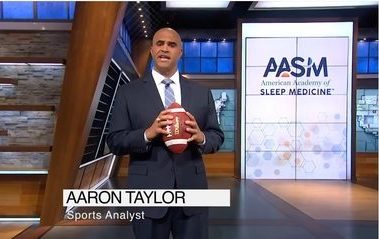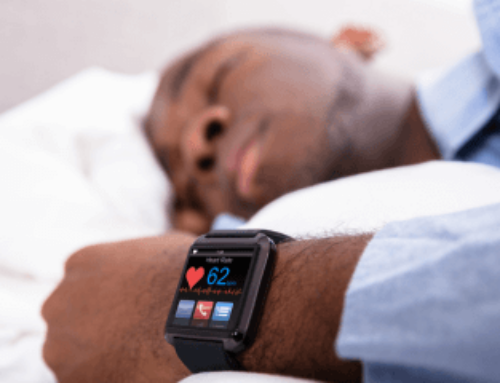DARIEN, IL – The American Academy of Sleep Medicine (AASM) and former NFL offensive lineman Aaron Taylor have partnered to launch two new public service announcements (PSAs) urging television viewers to “Defend Your Sleep” by talking to a doctor about obstructive sleep apnea – a potentially life-threatening disease involving episodes of complete or partial airway obstruction during sleep. The PSAs, which will air now through the end of 2018, debut at a pivotal time, as research shows the number of U.S. adults who have sleep apnea is on the rise.
“Sleep apnea afflicts nearly 30 million American adults, and most of them remain untreated, increasing their risk of cardiovascular disease, hypertension, stroke and Type 2 diabetes,” said AASM President Dr. Douglas B. Kirsch. “With Aaron’s help, we hope to further educate the community about the warning signs of sleep apnea and demonstrate that many of the damaging effects of the disease can be stopped, and even reversed, through diagnosis and treatment by the sleep team at an accredited sleep center.”
For Taylor, sleep apnea is personal. An avid snorer since he was in high school, he found himself with a lack of energy that began to affect his family life and performance on the field. However, it was not until two friends with sleep apnea died prematurely that he sought help from his doctor.
“At the end of the day, I wasn’t going to let unhealthy sleep take away the opportunities I have in life to spend precious time with my wife and children,” said Taylor. “My family encouraged me to undergo a sleep study, and it was one of the best decisions of my life because I started feeling like my old self again and getting more of what I wanted out of my life. I want to share my experience with others and hope these public service announcements further a much-needed conversation about sleep apnea.”
In a 30-second PSA, Taylor speaks with studio host Adam Zucker and fellow football analysts Randy Cross and Brian Jones about the sleep apnea warning signs that he experienced. Taylor also urges viewers to get help for sleep apnea in a 15-second PSA.
According to the AASM, typical risk factors and symptoms of sleep apnea include:
- Snoring: Loud and frequent snoring is a common symptom of sleep apnea. More than just a nuisance to your bed partner or roommate, snoring is a warning sign that should be taken seriously.
- Choking or gasping during sleep: When snoring is paired with choking, gasping or silent breathing pauses during sleep, it is a strong indicator of sleep apnea.
- Fatigue or daytime sleepiness: Sleep apnea can leave you waking in the morning feeling tired, even after a full night’s sleep. Excessive daytime sleepiness often occurs because sleep apnea causes numerous arousals throughout the night, preventing your body from getting the quality sleep it needs.
- Obesity: An adult with a body mass index (BMI) of 30 or higher is considered obese, and the risk of sleep apnea increases with the amount of excess body weight.
- High blood pressure: A staggering 75 million Americans have high blood pressure, which is about one in every three adults. Between 30 and 40 percent of adults with high blood pressure also have sleep apnea, and getting treatment for sleep apnea can help control blood pressure.
For more information, visit DefendSleep.com. To request a copy of the PSAs or an interview with Taylor about his personal experience with sleep apnea, please email mkasik@lcwa.com.
About the American Academy of Sleep Medicine
Established in 1975, the American Academy of Sleep Medicine (AASM) improves sleep health and promotes high quality, patient-centered care through advocacy, education, strategic research, and practice standards. The AASM has a combined membership of 10,000 accredited member sleep centers and individual members, including physicians, scientists and other health care professionals.





